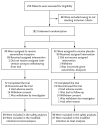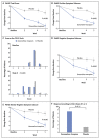Muscarinic Cholinergic Receptor Agonist and Peripheral Antagonist for Schizophrenia
- PMID: 33626254
- PMCID: PMC7610870
- DOI: 10.1056/NEJMoa2017015
Muscarinic Cholinergic Receptor Agonist and Peripheral Antagonist for Schizophrenia
Abstract
Background: The muscarinic receptor agonist xanomeline has antipsychotic properties and is devoid of dopamine receptor-blocking activity but causes cholinergic adverse events. Trospium is a peripherally restricted muscarinic receptor antagonist that reduces peripheral cholinergic effects of xanomeline. The efficacy and safety of combined xanomeline and trospium in patients with schizophrenia are unknown.
Methods: In this double-blind, phase 2 trial, we randomly assigned patients with schizophrenia in a 1:1 ratio to receive twice-daily xanomeline-trospium (increased to a maximum of 125 mg of xanomeline and 30 mg of trospium per dose) or placebo for 5 weeks. The primary end point was the change from baseline to week 5 in the total score on the Positive and Negative Syndrome Scale (PANSS; range, 30 to 210, with higher scores indicating more severe symptoms of schizophrenia). Secondary end points were the change in the PANSS positive symptom subscore, the score on the Clinical Global Impression-Severity (CGI-S) scale (range, 1 to 7, with higher scores indicating greater severity of illness), the change in the PANSS negative symptom subscore, the change in the PANSS Marder negative symptom subscore, and the percentage of patients with a response according to a CGI-S score of 1 or 2.
Results: A total of 182 patients were enrolled, with 90 assigned to receive xanomeline-trospium and 92 to receive placebo. The PANSS total score at baseline was 97.7 in the xanomeline-trospium group and 96.6 in the placebo group. The change from baseline to week 5 was -17.4 points with xanomeline-trospium and -5.9 points with placebo (least-squares mean difference, -11.6 points; 95% confidence interval, -16.1 to -7.1; P<0.001). The results for the secondary end points were significantly better in the xanomeline-trospium group than in the placebo group, with the exception of the percentage of patients with a CGI-S response. The most common adverse events in the xanomeline-trospium group were constipation, nausea, dry mouth, dyspepsia, and vomiting. The incidences of somnolence, weight gain, restlessness, and extrapyramidal symptoms were similar in the two groups.
Conclusions: In a 5-week trial, xanomeline-trospium resulted in a greater decrease in the PANSS total score than placebo but was associated with cholinergic and anticholinergic adverse events. Larger and longer trials are required to determine the efficacy and safety of xanomeline-trospium in patients with schizophrenia. (Funded by Karuna Therapeutics and the Wellcome Trust; ClinicalTrials.gov number, NCT03697252.).
Copyright © 2021 Massachusetts Medical Society.
Conflict of interest statement
Dr. Brannan reports being employed by and owning stock in Karuna Therapeutics; Ms. Sawchak, being employed by and owning stock options in Karuna Therapeutics; Dr. Miller, being employed by and owning stock in Karuna Therapeutics and holding patent US10369143 on muscarinic combinations, licensed to Karuna Therapeutics; Dr. Lieberman, serving on an advisory board for Karuna Therapeutics and Intra-Cellular Therapies; Dr. Paul, serving as a board member for and owning stock in Alnylam Pharmaceuticals, Sage Therapeutics, and Voyager Therapeutics, being employed by and owning stock and stock options in Karuna Therapeutics, and owning stock options in BioXcel Therapeutics; and Dr. Breier, receiving consulting fees from BioXcel Therapeutics, receiving consulting fees and advisory board fees from and owning stock and stock options in Karuna Therapeutics, and receiving consulting fees and advisory board fees from and owning stock options in Perception Neuroscience. No other potential conflict of interest relevant to this article was reported.
Figures


Comment in
-
Clinical Trial of New Drug for Schizophrenia.N Engl J Med. 2021 Jun 24;384(25):e105. doi: 10.1056/NEJMc2104965. N Engl J Med. 2021. PMID: 34161715 No abstract available.
References
-
- Leucht S, Cipriani A, Spineli L, et al. Comparative efficacy and tolerability of 15 antipsychotic drugs in schizophrenia: a multiple-treatments meta-analysis. Lancet. 2013;382:951–62. - PubMed
-
- Conley RR, Kelly DL. Management of treatment resistance in schizophrenia. Biol Psychiatry. 2001;50:898–911. - PubMed
-
- Marder SR, Cannon TD. Schizophrenia. N Engl J Med. 2019;381:1753–61. - PubMed
-
- Lieberman JA, First MB. Psychotic disorders. N Engl J Med. 2018;379:270–80. - PubMed
Publication types
MeSH terms
Substances
Associated data
Grants and funding
LinkOut - more resources
Full Text Sources
Other Literature Sources
Medical
